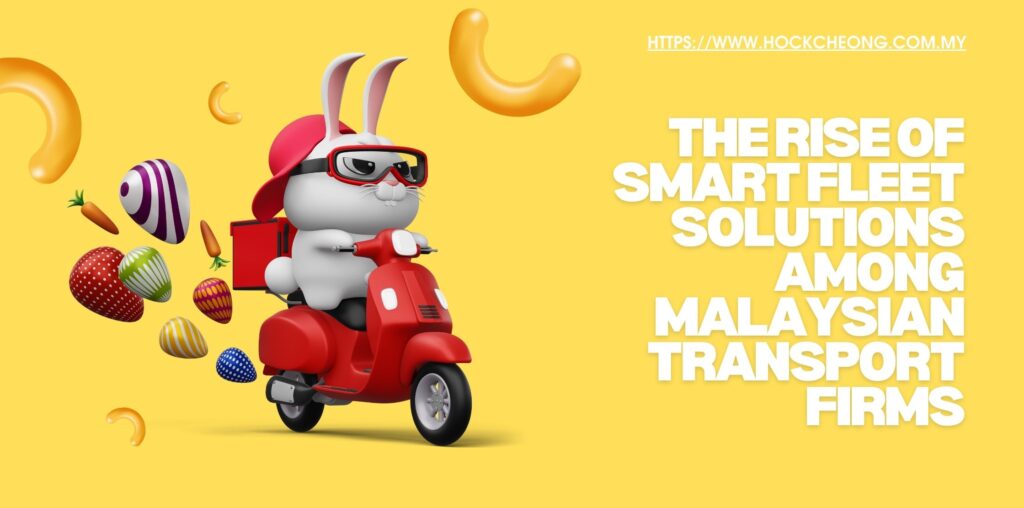The transportation industry in Malaysia is undergoing a digital transformation. In recent years, there has been a growing adoption of smart fleet solutions among transport firms—spurred by the need for efficiency, cost-effectiveness, safety, and environmental sustainability. As the nation continues to position itself as a key logistics and trade hub in Southeast Asia, the integration of technology into fleet management is no longer a luxury—it’s a necessity.
What Are Smart Fleet Solutions?
Smart fleet solutions refer to the use of advanced digital technologies to monitor, manage, and optimize fleet operations. These typically include:
- GPS tracking systems
- Fleet management software
- Fuel management systems
- Driver behavior monitoring
- Predictive maintenance tools
- Data analytics dashboards
- Integration with Internet of Things (IoT) devices
These technologies provide real-time insights into the status of vehicles, driver performance, routes, fuel usage, and even cargo condition—allowing transport company in Malaysia to make smarter, data-driven decisions.
Why Are Malaysian Transport Firms Adopting Smart Fleet Solutions?
Several key factors are driving this transformation in Malaysia:
1. Rising Operational Costs
Fuel prices, vehicle maintenance, insurance premiums, and labor costs continue to rise. Smart fleet solutions help transport firms reduce costs by optimizing routes, reducing idle time, preventing breakdowns, and monitoring fuel usage more efficiently.
2. Growing Customer Expectations
Customers now demand real-time delivery tracking and faster turnaround times. With smart fleet systems, companies can provide live updates and ensure prompt service—boosting customer satisfaction and loyalty.
3. Compliance with Regulations
Malaysian transport firms must comply with various safety and environmental regulations. Fleet solutions assist with record-keeping, maintenance scheduling, and emissions monitoring, helping companies avoid penalties and maintain compliance effortlessly.
4. Increased Competition
With more local and international players entering the Malaysian logistics space, staying competitive means adopting technologies that enhance speed, accuracy, and cost-efficiency.
5. Sustainability Goals
Malaysia is committed to reducing its carbon footprint, and many businesses are following suit. Smart fleet solutions contribute to sustainability by reducing fuel wastage and promoting eco-friendly driving behavior.
Key Features That Make Smart Fleet Systems a Game-Changer
Here are some of the features that are making smart fleet systems invaluable to Malaysian transport companies:
Real-Time GPS Tracking
Knowing where every vehicle is at any given time enables better dispatching, reduces unauthorized usage, and improves ETA accuracy. This is especially useful for logistics companies serving areas like Kuala Lumpur, Johor Bahru, and Penang, where traffic can be unpredictable.
Predictive Maintenance
Instead of waiting for a breakdown, transport firms can now use data to predict and prevent failures. This minimizes downtime, reduces repair costs, and extends the lifespan of vehicles.
Driver Behavior Monitoring
Smart sensors track driving habits—speeding, harsh braking, idling, and more. Fleet managers can then train or reward drivers based on performance, improving safety and reducing accident risks.
Fuel Management
By tracking fuel consumption and detecting anomalies, companies can significantly reduce fuel theft and improve overall efficiency.
Centralized Dashboard
A unified dashboard allows companies to manage all operations from a single platform—tracking delivery progress, monitoring vehicle health, assigning jobs, and accessing performance analytics.
Real-Life Adoption in Malaysia
Many Malaysian firms have already embraced these technologies with impressive results.
For instance, some logistics providers operating nationwide across Peninsular and East Malaysia have reduced fuel consumption by up to 20% using route optimization and eco-driving analytics. Bus operators have improved passenger safety by monitoring driver behavior in real time. Cold chain transporters have installed temperature-monitoring IoT sensors to ensure perishable goods arrive in optimal condition.
Even smaller courier companies and last-mile delivery services are investing in affordable fleet tracking apps to remain agile and competitive in the e-commerce boom.
Challenges and Considerations
While the benefits are substantial, the adoption of smart fleet solutions does come with challenges:
- Initial Investment: The cost of installing new systems can be high, especially for SMEs. However, government incentives and long-term ROI often justify the expense.
- Training Needs: Employees and drivers may need time to adapt to new systems. Ongoing training and support are essential.
- Data Security: As operations become more data-driven, ensuring cybersecurity becomes a top priority.
- Integration Issues: Older vehicles or legacy software systems may need upgrades or retrofitting for seamless integration.
The Future of Smart Fleets in Malaysia
Looking ahead, the integration of Artificial Intelligence (AI), 5G, and blockchain could further revolutionize fleet operations in Malaysia. Autonomous vehicle trials are already being discussed in the logistics sector, while AI-driven route planners are becoming more mainstream.
Additionally, government support for Industry 4.0 and digitalization initiatives is likely to accelerate the adoption of smart technologies in transport and logistics.
Conclusion
The rise of smart fleet solutions marks a new era for Malaysian transport firms. From improving operational efficiency and safety to meeting sustainability goals, these technologies are reshaping how goods and people move across the country.
For transport companies looking to stay relevant and competitive in the digital age, embracing smart fleet solutions is no longer optional—it’s the road ahead.


